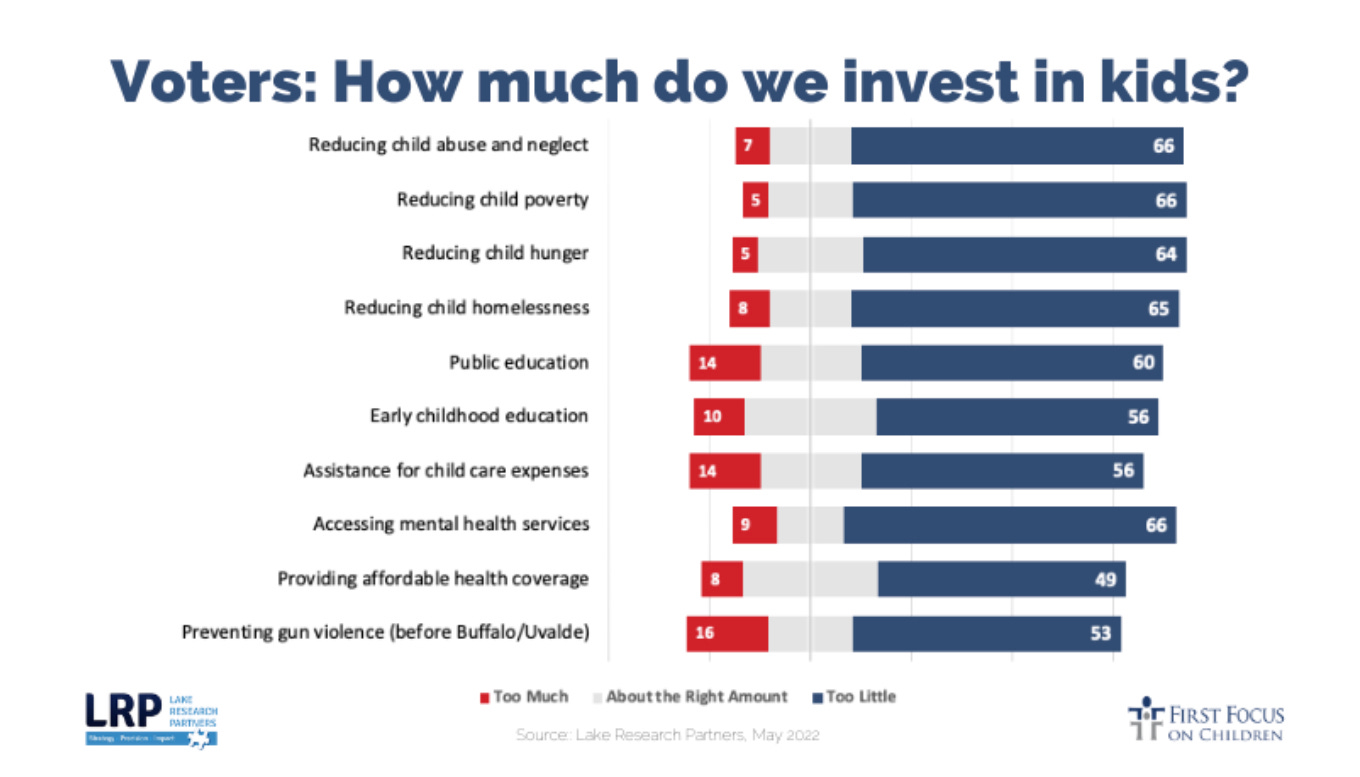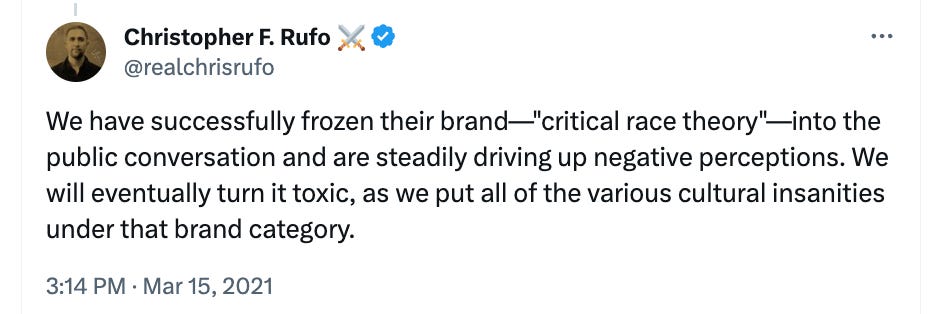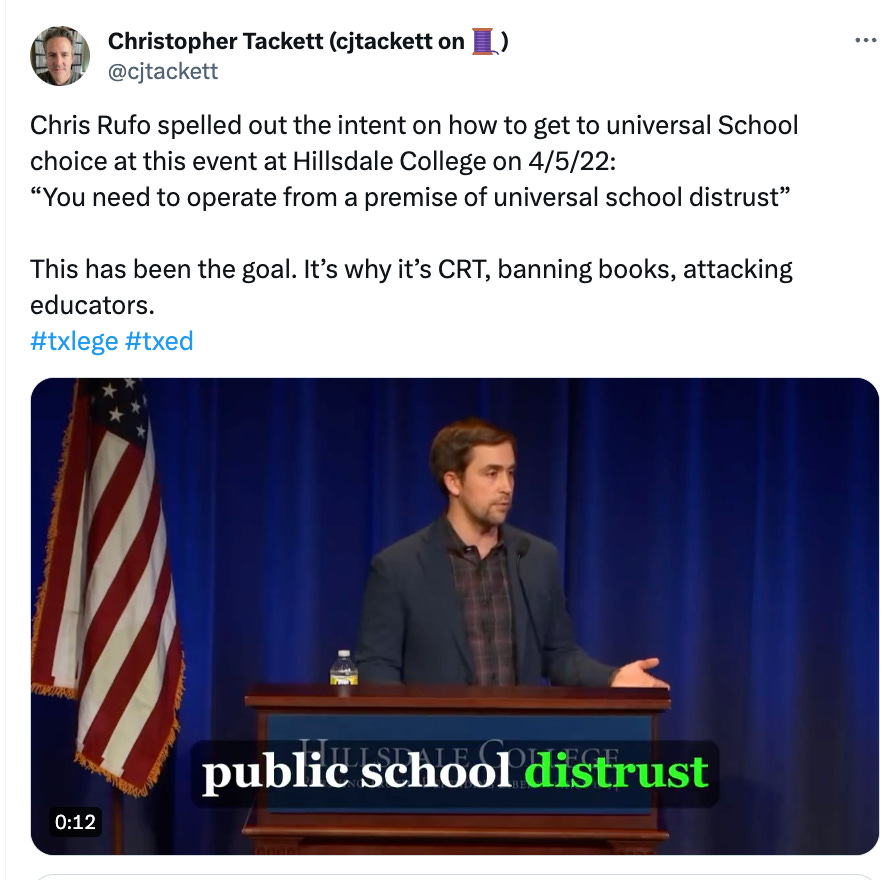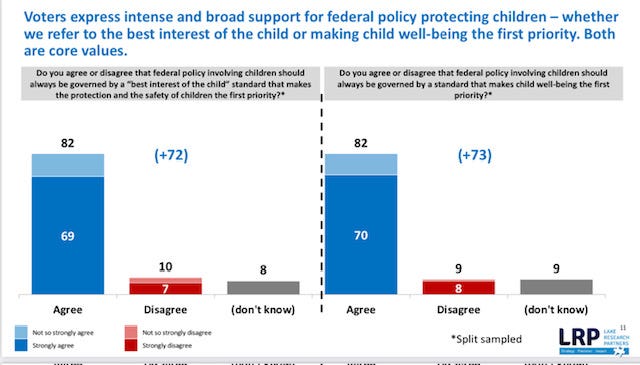The vast majority of parents in this country are deeply grateful to their kids’ teachers, the work they do, and for their partnership in helping their children learn, grow, and tackle unprecedented challenges facing kids. They appreciate how difficult it is to teach classrooms of children while attempting to learn about and respond to the individual needs of individual students.
Sadly, rather than prioritizing the real needs of children – rising rates of child mortality, education funding shortfalls, threats of violence, food insecurity, uninsurance, and homelessness – many legislators have decided to divert attention from those needs by stoking fear and the promotion of a culture war driven agenda intended to promote division (“in-groups” versus “out-groups”), discord, discrimination, and hate. Theirs is an agenda that leaves parents and their children by themselves and left to sink or swim with as little support as possible.
Journalist Melissa Gira Grant cites the scholar Ruth Wilson Gilmore in calling this agenda as “organized abandonment.”
At First Focus on Children and First Focus Campaign for Children, we look carefully at the research about how best to improve the lives and development of children. We know that politics that improve support for children and their families and expand opportunities available to the next generation can address the challenges and threats children and parents face and can help them achieve their full potential.
Opposition to such an agenda is driven by a variety of factors, including an underlying disdain for children (“childism”), a parental agenda of helping “my child” gain a competitive advantage over other children even if that means holding other kids down, a full-throttled embrace of individualism, intergenerational conflict or warfare, the use of children as pawns in a set of cultural wars, the use of children as bargaining chips to push for other agendas, and the use of children to gain advantage in partisan politics.
This is a battle of two agendas.
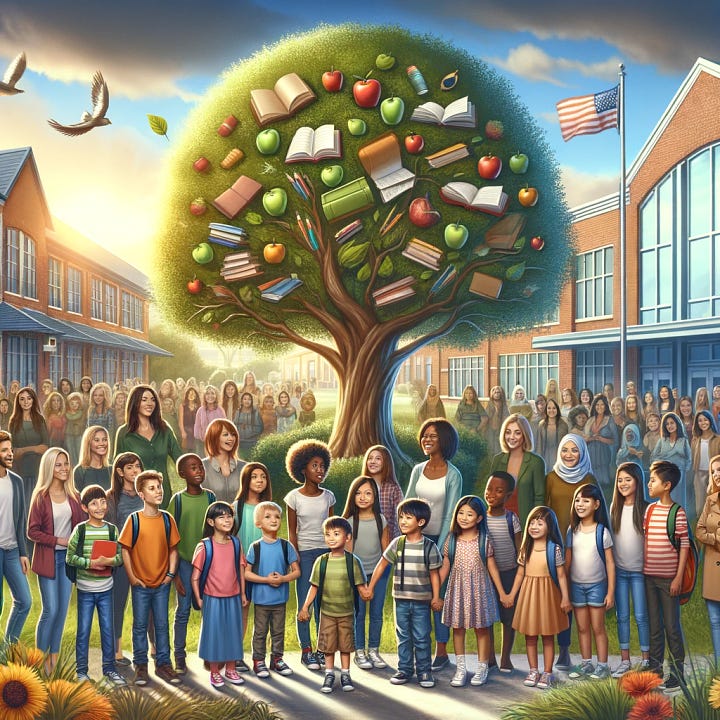
While other groups (i.e., senior citizens, people of color, women, people with disabilities, etc.) face their own political challenges, they at least can wield some power over policymakers by using their vote, contributing to political campaigns, or forming and mobilizing a membership group to press their concerns and interests. Children cannot. In the political system, children are often among the least powerful.
In an explanation of “Social Construction Theory” by professors Anne Schneider and Helen Ingram, they find that “Dependents (including children) are often perceived favorably but lack political power. This leads policymakers to offer “lip service” to their needs and concerns but only limited tangible support.1
Kids often do not pose a threat or offer opportunity to others in society, which leads to a form of neglect or invisibility that has negative consequences, including long-term underinvestment.2
On the other hand, children do evoke empathy and pro-social attitudes from the public,3 with polling consistently indicating strong support for children’s policies such as investments in public education, child health, nutrition, and child abuse prevention.
🎧 Listen to Celinda Lake of Lake Research Partners discussing polling on children’s issues in the “Who’s for Kids, and Who’s Just Kidding?” Speaking of Kids podcast episode
Therefore, the vast majority of the public would not welcome a direct attack on children.
Opponents of children understand this, so their points of attack are rarely direct. Opponents of extending the fully refundable Child Tax Credit could not get away with saying that more than doubling child poverty from 5.2% to 12.4% is a good thing for children or the country, so they focus more on the perceived “deservingness” of parents and the myth of “welfare queens” to justify their opposition.
Do not be fooled though. The expiration of the improved Child Tax Credit was an unconscionable disaster for millions of children and their families across the country.
Likewise, opponents of education funding for children cannot succeed by claiming that students do not deserve to be properly educated, so they pick other “boogeymen” to attack (i.e., teacher unions, LGBTQ concerns, DEI, CRT, social-emotional learning, school health, librarians, etc.).
Under the guise of “parental rights,” opponents of public education have devised an elaborate scheme to undermine schools and teachers by hatching conspiracies in every book, every classroom, every school, every bathroom, every sports team, every counselor’s office, and every library. For example:
- Critical race theory (CRT) isn’t taught in K-12 education, so the attack is on something that isn’t taught in public schools.
- The literal opposite of diversity, equity, and inclusion (DEI) is segregation, inequality, exclusion, and discrimination, but somehow, according to public school opponents, it is DEI that represents those things (even George Orwell would be impressed by the “doublespeak”).
- Truth is irrelevant if you can get people, including a shocking number of politicians, to believe or spread the lie that schools have “kitty litter boxes” in bathrooms for students who identify as cats or “furries.” Schools don’t.
- Porn is never taught in school and every state has obscenity laws already, but that doesn’t matter. States are passing a raft of bills that are promoting book bans, censorship, and speech codes.
Again, don’t be fooled.
Suppose far-right activists like Christopher Rufo, Betsy DeVos, Christian White nationalists, and groups like Moms for Liberty and the Heritage Foundation can stir up fear, moral panic, and a shift in thinking about education from something that supports the learning and success of all children and democracy to something that is about an individual parent who must protect their individual child from perceived or even made up threats to give them a leg up on “out-group” kids. In that case, they will be able to successfully drive a wedge between parents and educators and destroy public education.
Again, with respect to their agenda of book bans, the imposition of speech codes, the whitewashing of curriculum, and similar attacks on higher education governance, Gira Grant refers to what Gilmore calls “organized abandonment.” These tactics become a vicious cycle. As Gira Grant writes:
Whether these educators and other staff who have a choice in the matter stay or leave, they are forced into enacting that abandonment. Schools are hollowed out and then held up as symbols of decay. Then the finger is pointed back at the educators: The students are being failed, and it’s their fault.
However, undermining and eliminating partners for parents (Moms for Liberty, for example, loves to proclaim “we don’t co-parent with government”) is fundamental to why parenting is uniquely challenging in the U.S. As Stephanie Murray explains in The Atlantic:
…the United States is a rich country, and it could afford to alleviate some of the challenges its parents face. Instead, the U.S. mostly regards children, and the vital task of raising them, as a personal matter.
The “organized abandonment” agenda seeks to:
- Replace public education and the expertise of teachers with parents being solely responsible for their children’s education (and sometimes with horrifying consequences, as with the establishment of neo-Nazi curriculum with homeschooling membership in Ohio);
- Replace the expertise of pediatricians and other health professionals with the decision of parents to decide all matters (e.g., vaccinations, mental health, and even cancer treatment) with respect to child health;
- Eliminate school lunch programs and require low-income parents to find a food pantry or charity to keep their child from going hungry;
- Eliminate food and product safety experts with parents trying to navigate and figure out what food is tainted and what products may or may not have lead in them;
- Abandon any semblance of gun safety to protect children and put that burden on parents to scramble and buy “bullet-proof backpacks” in the desperate hope of protecting their children from gun deaths, which are now the leading cause of death of kids; and,
- Abandon government oversight of institutions, which are intended to protect children from harm, with nothing than parental judgment (see, for example, the litany of child abuse scandals that involve the U.S. Women’s Gymnastics Team, the Boy Scouts, the Catholic Church, Jerry Sandusky/Penn State, the Mormon Church, Jeffrey Epstein scandal, Southern Baptist Convention, The Troubled Teen Industry, and Child Labor).
These far-right activists use fear, chaos, division, and conflict as tactics to achieve their ultimate goal of destroying public education, defunding investments in children, and isolating or relying on parents in the name of “liberty.” They have admitted so quite publicly.
In fact, Christoper Rufo spelled out this subversion in a speech at Hillsdale College when he said:
I think you want to create the conditions for fundamental structural change… To get universal school choice (vouchers), you really need to operate from a premise of universal public school distrust.
As Zach Beauchamp wrote in his excellent review of Rufo’s philosophy and strategy in a Vox article entitled “Chris Rufo’s dangerous fictions”:
Don Quixote needs his windmills.
Meanwhile, the Heritage Foundation has published an upside-down school “report card” whose metrics are so ludicrous that states are specifically rewarded for defunding public schools, promoting private school vouchers and higher percentages of homeschooled children, and employing more uncertified teachers in their schools.4
The “report card” extensively promotes the views of Milton Friedman, who told an American Legislative Exchange Council (ALEC) group in 2006 that it would be “ideal way would be to abolish the public school system and eliminate all the taxes that pay for it.”
You can’t even make this stuff up.
Reporter Kathryn Joyce quotes Beth Lewis of Save Our Schools Arizona making the point:
The fact that the Heritage Foundation ranks Arizona second in the country, when our schools are funded nearly last in the nation, only underscores the depraved lens with which they view the world… Heritage boasting about realizing Milton Friedman’s dream reveals the agenda — to abolish public schools and put every child on a voucher in segregated schools.
As Carol Burris of the Network for Public Education adds:
With this report, the Heritage Foundation puts its values front and forward — that schooling should be a free-for-all marketplace where states spend the least possible on educating the future generation of Americans, with no regulations to preserve quality.
Instead of fiction, division, and public school abandonment, we must recenter the debate about education on what is best for our children. We cannot emphasize this enough, but education is about children – not the “organized abandonment” agenda being promoted by Rufo, DeVos, Moms for Liberty, the Heritage Foundation, et al.
For example:
- Moms for Liberty wants to block school-based health services. Would denying students access to school-based health services benefit them? NOPE.
- Is destroying the teaching profession causing teaching shortages across the country good for children? NEVER.
- Are book bans good for children? NO. BOOK BANNERS ARE NEVER THE GOOD GUYS.
- Are laws that attack LGBTQ kids and their families good for them? In a diverse society, do these laws promote tolerance and understanding? OBVIOUSLY NOT.
These strategies might serve individuals promoting the “politics of division,” but when it comes to child policy, the best interests and well-being of children themselves should always come first (and the American public overwhelmingly agrees).
Adam Benforado, author of A Minor Revolution: How Prioritizing Kids Benefits Us All, says:
…when it comes to helping children reach their potential, it is our broad societal policies, not our individual choices, that matter most. But the business of raising kids, is atomized: each family is left on its own to sink or swim.
Instead, he argues:
Every child should enjoy a federal guarantee to free public education with top-quality facilities, a strong research-based curriculum, highly qualified engaged teachers, and small classroom sizes.
🎧 Listen to Professor Adam Benforado discussing how to center children in policymaking in the “Creating a Children-First Mindset in Policy and Society” Speaking of Kids podcast episode
In my last blog, I argued for an affirmative agenda for child health. We need to reassert such an agenda for education as well, which starts with investing in public education, teachers, and public education. This is the focus of members of the Alliance for Student Liberty.
Join us in support of our children and in opposition to “organized abandonment.”

